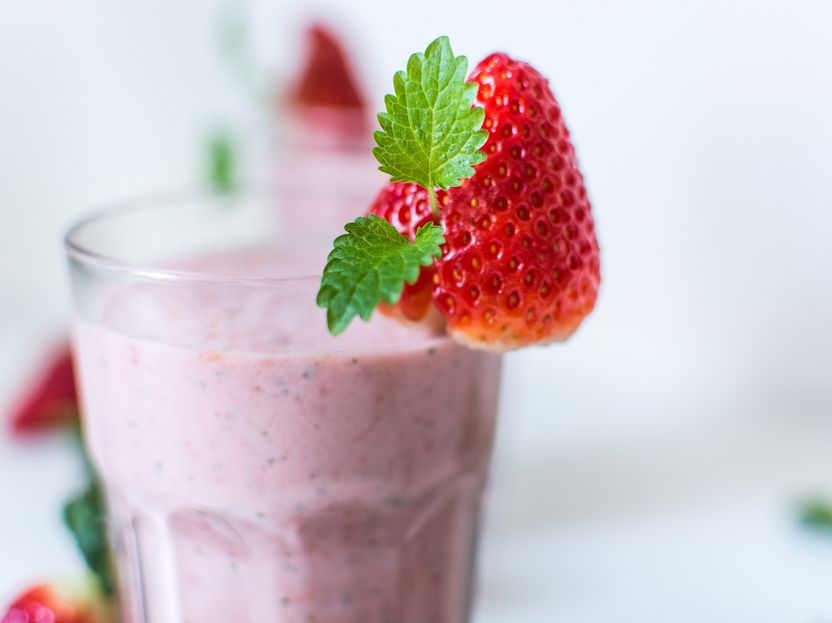Doped by food
Dopamine release regulates our eating behaviour
When it comes to our food intake, we are only partially in control. Scientists at the Max Planck Institute for Metabolism Research in Cologne were able to show that our gastrointestinal tract is in constant contact with the brain and uses reward stimuli to control our desire for food.

The messenger substance dopamine acts in the brain as a reward signal for eating.
GettyImages
Dopamine is the most important messenger substance of the reward system in the brain and is released when, for example, goals are achieved or desire for something motivates us to take action. In elaborate studies, research group leaders Marc Tittgemeyer and Heiko Backes have investigated the question of how food intake in the body is actually controlled. The scientists offered milkshakes to volunteers and at the same time measured the release of dopamine in the brain using a newly developed method.
With the first taste of the milkshake, the brain immediately releases an initial wave of dopamine. As soon as the drink then reaches the stomach, another round of dopamine is released. "Previous experiments with mice have shown that when food reaches the stomach, it is reported to the brain. Our results show that this also happens in humans and, in addition, which specific brain areas are involved," explains Tittgemeyer.
The researchers have also found a link between subjective desire and dopamine release: The brains of participants who had a particular craving for the milkshake, released more dopamine when they tasted the drink. As soon as it reached the stomach, however, less dopamine was released. "Our data show that our cravings are closely related to dopamine. If we don't get the second release of dopamine through the stomach, we might continue to eat until we do", explains Backes.
Food intake primarily supplies the body with energy and nutrients. Ideally, energy consumption and food intake are in constant balance. However, food also has a rewarding value: "If the reward signals are stronger than the equilibrium signal, we eat more than necessary, which can lead to overweight and obesity," says Backes.
Can obesity then be prevented by controlling the release of dopamine? "Unfortunately, it's not that easy," answers Tittgemeyer. "How our body signals influence our actions and how we can influence those signals, for example through cognitive control, is not yet really understood. More research is still needed."
Original publication
Sharmili Edwin Thanarajah, Heiko Backes, Alexandra G. DiFeliceantonio, Kerstin Albus, Anna Lena Cremer, Ruth Hanssen, Rachel N. Lippert, Oliver A. Cornely, Dana M. Small, Jens C. Brüning, Marc Tittgemeyer; "Food intake recruits orosensory and post-ingestive dopaminergic circuits to affect eating desire in humans"; Cell Metabolism; 2019.
Most read news
Original publication
Sharmili Edwin Thanarajah, Heiko Backes, Alexandra G. DiFeliceantonio, Kerstin Albus, Anna Lena Cremer, Ruth Hanssen, Rachel N. Lippert, Oliver A. Cornely, Dana M. Small, Jens C. Brüning, Marc Tittgemeyer; "Food intake recruits orosensory and post-ingestive dopaminergic circuits to affect eating desire in humans"; Cell Metabolism; 2019.
Organizations
Other news from the department science

Get the life science industry in your inbox
By submitting this form you agree that LUMITOS AG will send you the newsletter(s) selected above by email. Your data will not be passed on to third parties. Your data will be stored and processed in accordance with our data protection regulations. LUMITOS may contact you by email for the purpose of advertising or market and opinion surveys. You can revoke your consent at any time without giving reasons to LUMITOS AG, Ernst-Augustin-Str. 2, 12489 Berlin, Germany or by e-mail at revoke@lumitos.com with effect for the future. In addition, each email contains a link to unsubscribe from the corresponding newsletter.
Most read news
More news from our other portals
Last viewed contents

Turning fallen leaves into sustainably made paper - Ukrainian scientist selected as a finalist for the Young Inventors Prize 2024

Merck Celebrates Topping-Out Ceremony for New Membrane Production Plant - Investment of more than € 140 million creates approximately 55 new jobs






















































